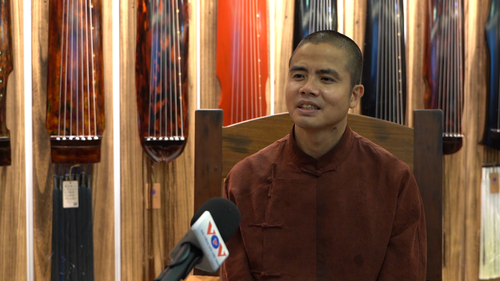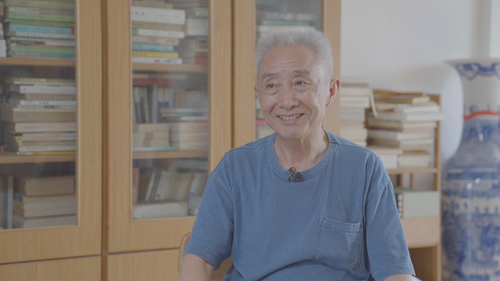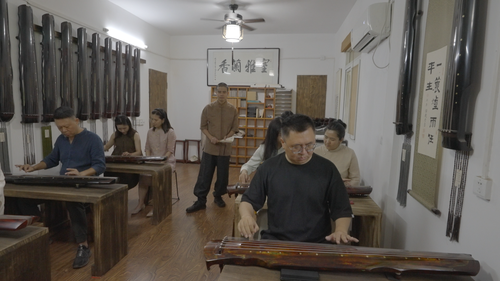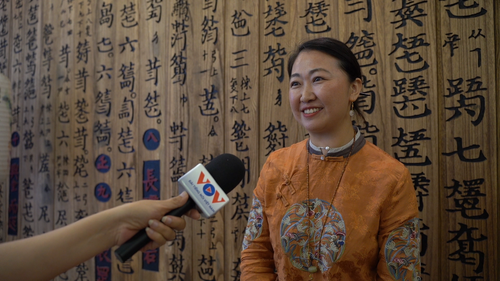 Doctor of Philosophy Nguyen Dien Tuan, the founder of the ‘Nantianfang’ studio (Photo: Bich Thuan) Doctor of Philosophy Nguyen Dien Tuan, the founder of the ‘Nantianfang’ studio (Photo: Bich Thuan)
|
Guqin has existed for more than 3,000 years and has traditionally been favored and played by scholars and literati in intimate settings as an instrument of great subtlety and refinement. It was never intended for public performance.
The guqin was one of the four arts, along with calligraphy, painting, and an ancient form of chess that Chinese scholars were expected to master.
For Doctor of Philosophy Nguyen Dien Tuan, an interest in traditional Chinese culture and a fascination with guqin music comes naturally.
His grandfather, a teacher, taught Tuan how to write Chinese characters. In 2005 he obtained his Doctorate in ancient Chinese literature at the Huazhong (Central China) Normal University in Wuhan, Hubei province.
He began learning to play the guqin in 2009 when, representing his university, he needed to demonstrate Chinese culture-related skills at the “Chinese Bridge,” an annual Chinese language proficiency competition.
The way Tuan learned the instrument is quite special. While studying for his PhD he suddenly "disappeared" for a year.
 Professor Dai Jianye, Tuan’s instructor (Photo: Bich Thuan) Professor Dai Jianye, Tuan’s instructor (Photo: Bich Thuan)
|
Professor Dai Jianye, Tuan’s instructor, says he never forgets how his Vietnamese student returned after almost a year’s absence and gave him a hand-crafted qin as a token of apology.
Dai recalled, “After talking to him, I realized that Nguyen Dien Tuan was very smart. His doctoral thesis of 200,000-300,000 words, entitled ‘Escape from the world of dust’, was published in China and widely read. I wrote the foreword for it.”
“None of my Chinese doctoral students were like him. Would you dare to abandon your studies for a year to learn a musical instrument on your own? He has no fear. Only passion,” Professor Dai admitted.
After living in Wuhan for 19 years, in 2010 Tuan established a studio called ‘Nantianfang’ in the scenic East Lake area.
A good player of a musical instrument is often good at making them, Tuan says. To ensure the quality of his instruments, he makes guqins using ancient techniques he learned on his own.
 Tuan is teaching Chinese people to play the guqin in the ‘Nantianfang’ studio. (Photo: Bich Thuan) Tuan is teaching Chinese people to play the guqin in the ‘Nantianfang’ studio. (Photo: Bich Thuan) |
Since 2016, he makes guqins and teaches students how to play the traditional Chinese instrument in the studio. In addition, Tuan has also been invited to talk and teach the traditional Chinese culture to Chinese people.
Tuan’s studio has attracted a rising number of music enthusiasts, many of them curious about how a Vietnamese person can become a master of China's traditional musical instrument.
Liu Gumei, who has studied with Tuan for 6 years and is now a guqin teacher, says she admires Tuan’s efforts in making instruments in the ancient style.
Liu recalled that she met Tuan teacher during a reading session which she believed to help her understand the profundity of traditional Chinese culture, and the sound of the guqin moved me.
“Tuan teaching changed me. It’s hard to make guqins and the makers are often allergic to the paint. But Tuan has made many qins and has done it for a decade. Because of his passion for the qin, he has diligently researched, uncovered documents, and taught himself. It wasn’t easy for him to go so far on this path alone," said Liu.
 Ms. Liu Gumei has worked with Tuan for 6 years (Photo: Bich Thuan) Ms. Liu Gumei has worked with Tuan for 6 years (Photo: Bich Thuan) |
He Xiaoyu, a newcomer to Tuan’s studio, said, “At first, I didn't think about learning the ancient instrument. But after meeting and talking with the teacher, I’ve been won over by the instrument and by Tuan’s personality. Teacher Tuan is a pure and sincere person.”
Professor Dai praised Tuan’s talent in ancient Chinese literature.
“You might not know he’s Vietnamese. Tuan understands Chinese culture better than at least 70% of Chinese people. This surprises me a lot. He has read more ancient books than 80% of Chinese people,” said the Professor, adding, “ Tuan has never been interested in making friends, yet he has friends everywhere. He learned to play the guqin without thinking about making money. It was simply an act of passion. So is his writing. I see in him the spirit of an honorable man.”
Tuan says the guqin is an ancient art with no borders, ethnicity, or region. He knew it would be a musical instrument he would play for the rest of his life the moment he touched it for the first time.
“Lots of people are trying to combine modern music with guqin music. This is also my desire aim, to adapt it to my favorite Vietnamese songs,” Tuan confessed and further explained, “Falling leaves return to their roots. As poet Che Lan Vien wrote, ‘While we stay, it's just a place to live. When we leave, the land has become the soul'. When I still lived in Vietnam, to be honest, I wasn’t clearly aware of what patriotism meant. But when one has the opportunity to go abroad to study, I think one should think about one’s Fatherland and fellow countrymen. That’s patriotism.”
Tuan expressed his hope to bring the culture of the guqin back to Vietnam and pass on my experience making guqins to others.
In 2008 the guqin was inscribed on the UN’s Representative List of the Intangible Cultural Heritage of Humanity.